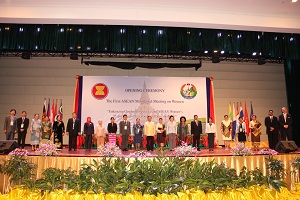Remarks by UN Women Deputy Executive Director John Hendra at the first ASEAN Ministerial meeting on UN Women
Date:

Remarks by UN Women Deputy Executive Director John Hendra at the first ASEAN Ministerial meeting on UN Women (AMMW). 19 October 2012.
[check against delivery]
Excellency, President of the Lao Women's Union,
Excellencies, Ministers and Heads of Delegations, ASEAN Plus Three
Deputy Secretary-General, ASEAN
On behalf of Madame Bachelet, Executive Director of UN Women, I would like to thank you very much for the opportunity to address the First ASEAN Ministerial Meeting on Women today.
I know you have been discussing all day today the progress made and challenges towards achieving gender equality and empowerment of women in ASEAN countries.
Significant progress has indeed been made in some areas. The MDG3 target on gender parity in primary school enrolment has been achieved in almost all ASEAN countries. Maternal mortality rates have declined in all ASEAN countries. And five countries in the region have parliaments with more than 20 percent female representation.
Economic growth has been very impressive in a number of countries in the region - including in Laos at 8 percent - making it all the more important to translate economic progress into inclusive development that benefits all women and men, and girls and boys.
With regard to challenges, you have already discussed these intensively today and I won't repeat them now. But it's worth highlighting that globally we are not on track to meet MDG5. Worldwide 800 women die each day from complications of pregnancy and childbirth. And disparities remain in attaining all the MDGs, in particular among poor women and women in remote and ethnic minority communities.
In addition, there is a long way to go to achieve parity in women's participation in parliament, with a majority of ASEAN member countries still below 25 percent. That's why it's so important that the post-2015 development framework focuses on qualitative measures of progress and not just quantitative outcomes.
Ministers and Heads of Delegations, you are to be commended for your leadership to promote gender equality and the empowerment of women, and the steps you have taken to date to pass and implement laws to promote gender equality and combat violence, and to put in place policy frameworks to promote women's participation, voice, opportunities and access to services.
I'm very appreciative of this great opportunity to speak with you today. I have four things I would like to discuss: the post-2015 development framework; next year's Commission on the Status of Women; UN Women's engagement with ASEAN and finally how you see UN Women's role in the region and in your countries.
First, with regard to the post-2015 development framework, I believe it is essential that we take a rights-based approach both to the process and to the framework itself. There are several key entry points including the Open Working Group that will develop the Sustainable Development Goals and the UN Development Group thematic and country consultations.
It's also critically important that we effectively engage the High-Level Panel, which is co-chaired by Indonesia, the UK and Liberia. We count on you to help us to do that as well as to help us to ensure that gender equality is addressed directly as a clear goal, and that gender is robustly mainstreamed into all other eventual goals, including through gender-sensitive targets and indicators.
Secondly, as you know, the priority theme of CSW 57 in 2013 is “Elimination and prevention of all forms of violence against women and girls. Violence against women remains widespread in ASEAN countries, and as you know, despite increased awareness, attitudes towards violence against women remain tolerant. All too often violence is seen as acceptable, many women don't speak out about the violence they experience, and families and communities often don't step in when violence is occurring.
It's really important that we ensure the best possible outcome from CSW 57 and we look forward to working with you as Ministers to achieve this - in particular those countries that are currently Member States of CSW - Indonesia, the Philippines and Thailand.
Thirdly, UN Women's engagement with ASEAN dates back to 2006 when we signed a Framework of Cooperation on joint activities and technical cooperation to eliminate violence against women in the ASEAN region. A key element has been the work with the ASEAN Committee for Women to share good practices on VAW and CEDAW among member states. More recently we've been working with the ASEAN Labour Ministers Meeting to engender the ASEAN Declaration on the Protection of Rights of Migrant Workers.
Since April 2010, UN Women has also been working with the ASEAN Inter-Governmental Commission on Human Rights (AICHR) and the ASEAN Commission on the Protection and Promotion of the Rights of Women and Children to promote women's rights through implementation of regional and international normative agreements. UN Women is committed to supporting ongoing regional integration processes to ensure that women have an equal opportunity to participate in and benefit from growth and development.
Finally, as UN Women, we are moving ahead to implement the new Regional Architecture with a Regional Office for Asia and the Pacific in Bangkok, and I am very pleased to introduce Roberta Clarke, our new Regional Director for the Asia Pacific region, to you today.
We are also making changes at the country level to strengthen our capacity and responsiveness and I am keen to hear how you see UN Women evolving, and how we can improve and better focus on gender equality priorities at the national level.